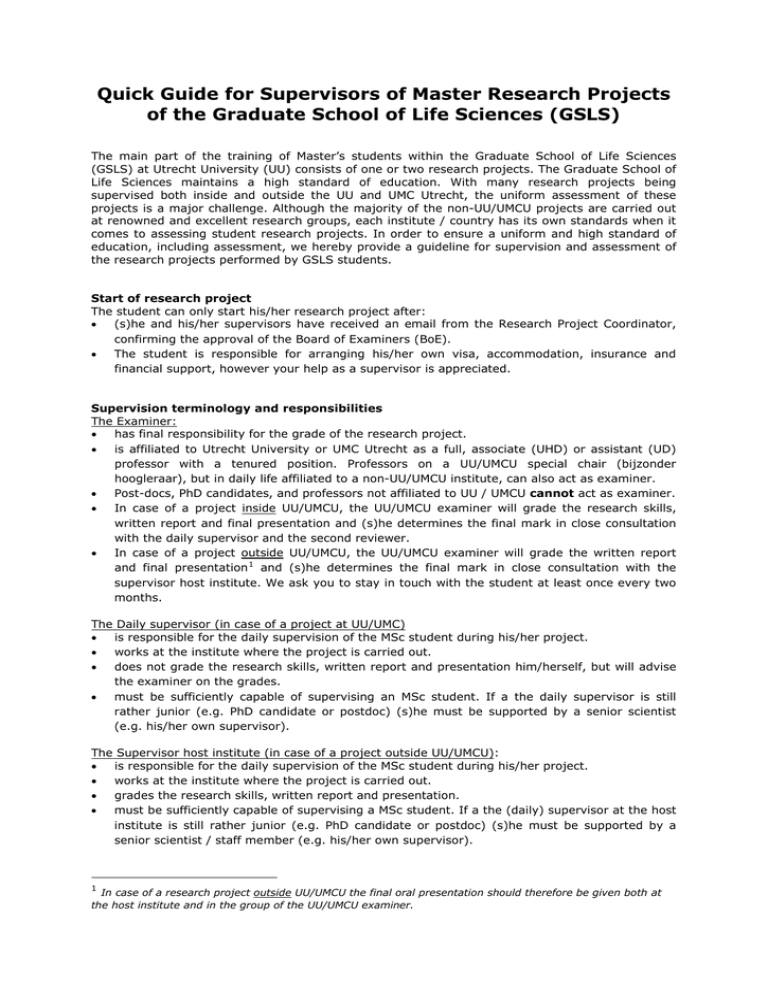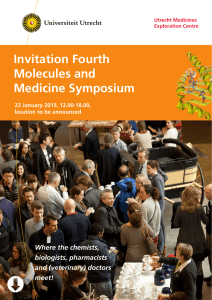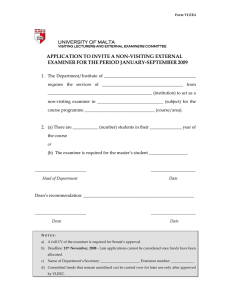Quick Guide for Supervisors of Master Research Projects of the
advertisement

Quick Guide for Supervisors of Master Research Projects of the Graduate School of Life Sciences (GSLS) The main part of the training of Master’s students within the Graduate School of Life Sciences (GSLS) at Utrecht University (UU) consists of one or two research projects. The Graduate School of Life Sciences maintains a high standard of education. With many research projects being supervised both inside and outside the UU and UMC Utrecht, the uniform assessment of these projects is a major challenge. Although the majority of the non-UU/UMCU projects are carried out at renowned and excellent research groups, each institute / country has its own standards when it comes to assessing student research projects. In order to ensure a uniform and high standard of education, including assessment, we hereby provide a guideline for supervision and assessment of the research projects performed by GSLS students. Start of research project The student can only start his/her research project after: • (s)he and his/her supervisors have received an email from the Research Project Coordinator, confirming the approval of the Board of Examiners (BoE). • The student is responsible for arranging his/her own visa, accommodation, insurance and financial support, however your help as a supervisor is appreciated. Supervision terminology and responsibilities The Examiner: • has final responsibility for the grade of the research project. • is affiliated to Utrecht University or UMC Utrecht as a full, associate (UHD) or assistant (UD) professor with a tenured position. Professors on a UU/UMCU special chair (bijzonder hoogleraar), but in daily life affiliated to a non-UU/UMCU institute, can also act as examiner. • Post-docs, PhD candidates, and professors not affiliated to UU / UMCU cannot act as examiner. • In case of a project inside UU/UMCU, the UU/UMCU examiner will grade the research skills, written report and final presentation and (s)he determines the final mark in close consultation with the daily supervisor and the second reviewer. • In case of a project outside UU/UMCU, the UU/UMCU examiner will grade the written report and final presentation 1 and (s)he determines the final mark in close consultation with the supervisor host institute. We ask you to stay in touch with the student at least once every two months. The Daily supervisor (in case of a project at UU/UMC) • is responsible for the daily supervision of the MSc student during his/her project. • works at the institute where the project is carried out. • does not grade the research skills, written report and presentation him/herself, but will advise the examiner on the grades. • must be sufficiently capable of supervising an MSc student. If a the daily supervisor is still rather junior (e.g. PhD candidate or postdoc) (s)he must be supported by a senior scientist (e.g. his/her own supervisor). The Supervisor host institute (in case of a project outside UU/UMCU): • is responsible for the daily supervision of the MSc student during his/her project. • works at the institute where the project is carried out. • grades the research skills, written report and presentation. • must be sufficiently capable of supervising a MSc student. If a the (daily) supervisor at the host institute is still rather junior (e.g. PhD candidate or postdoc) (s)he must be supported by a senior scientist / staff member (e.g. his/her own supervisor). 1 In case of a research project outside UU/UMCU the final oral presentation should therefore be given both at the host institute and in the group of the UU/UMCU examiner. Quick Guide Supervision Research Projects The Second reviewer: • should only be appointed for projects inside UU/UMCU. For projects outside UU/UMCU both examiner and supervisor host institute grade the report and presentation, therefore a second reviewer is not required. • is a senior scientist (not a PhD candidate or postdoc) who is not directly involved in the research performed. Ideally, a second reviewer is a staff member from a different group than the examiner. • Evaluation of the research report and final oral presentation by a second reviewer is mandatory. Length of the project and extension • The final presentation and the final written report must be delivered within 12 months after the start of the project for a major research project or within 9 months for minor research projects. • Research projects can be extended with 6, 9 or 12 credits from the elective component. • The student should apply for this extension before the start of his/her research project. This can be pointed out on the application form. • After the research project has already started, it can only be extended with the elective component as an exception. In this case the student should apply for the extension, well before the start of the extension, by handing in a letter to the Board of Examiners with a formal request and signed by examiner, programme coordinator and student. Contents of the research project • A research project consists of several key stages: drawing up a timetable, reviewing literature, drawing up a research plan, carrying out experiments / collecting data, data analysis, writing the report and presenting orally. • Participation in group meetings and other group activities are part of the research project. • Reports should be written in English and contain a summary specifically aimed at informing the general audience about the content of the research project (laymen’s summary – in Dutch or English, 500 words, the target audience is able to understand Biology at high school level). • All students have to present their work orally (in English) to the research group of their examiner at Utrecht University / UMCU (and, if applicable, also at the external host institute). • For more information about the content of the research projects please read chapter 4 of the Master Research Project Guide for supervisors. Interim assessment (feedback during project) • A mandatory evaluation meeting between student and examiner, and preferably also the daily supervisor, should take place two or three months after the start of the research project. Please note: this interim assessment conversation is different from regular work discussions. • In case of a research project outside UU/UMCU the interim assessment meeting is between the supervisor host institute and the student. The examiner must be informed about the outcome of this meeting (e.g. by sending a copy of the signed report or rubric via e-mail). • During the evaluation meetings the student receives feedback on his/her work, progress and performance. We strongly advise you to use Rubric about research skills as a tool to discuss the applicable strong points and points of improvement of the student. • Afterwards the student has to either hand in the highlighted rubric or write a short report (½ A4) summarizing for which criteria (s)he is on the right track, and which parts need more attention. (S)he can use this form to write his/her report. • The highlighted rubric or report has to be signed by the examiner (project inside UU/UMCU) or the supervisor host institute (project outside UU/UMCU). • It is important to evaluate the work and progress of the student on a regular basis. Evaluation meetings can be scheduled more often, if preferred. • For more information about the supervision of the research projects please read chapter 5 of the Master Research Project Guide for supervisors. 2 Quick Guide Supervision Research Projects Fraud and plagiarism Fraud or plagiarism is absolutely not allowed and will be dealt with as described in the Educationand Examination Regulations. The examiner: • has the responsibility to ensure that no fraud or plagiarism took place. When you find or suspect that your student is committing fraud or is plagiarizing during his/her research project, this must be reported to the Board of Examiners (BoE). You are invited to contact the BoE first for advice: more information on how to deal with plagiarism or fraud. • should check the final research reports for plagiarism using Ephorus, or an alternative comparable plagiarism checker. • When the reported percentage of plagiarism in Ephorus is >10%, but there is no case of plagiarism, a motivation written by the examiner explaining this should accompany the assessment form. The student may only submit the assessment form of the research project if the summary of the Ephorus plagiarism check is attached to the assessment form. Final assessment At the end of a research project, the student is expected to have met the learning outcomes. In order to assess whether the student has achieved these learning outcomes we strongly advise you to use the Rubrics for research skills (60% of final grade), report (30%) and presentation (10%). All three elements have to be awarded at least a 5,5 in order for the student to pass the final examination of the project. In case of an project inside UU/UMCU, the assessment is performed by the examiner in close consultation with the daily supervisor and a second, independent reviewer (see ‘Supervision terminology and responsibilities’). In case of a project outside UU/UMCU, the supervisor host institute 2 grades all three components. The examiner and supervisor host institute should contact each other in order to make sure that the assessment of all components are performed according to the guidelines of the GSLS-UU. • First, the supervisor host institute determines the grades according to his/her own marking system (e.g. Anglo/Saxon marking (F-A+)). • Next, the supervisor host institute consults the UU/UMCU examiner. The examiner converts the grade according to the Dutch marking system. The conversion table is available here. If the examiners and second reviewers or host supervisors marks differ by 2 or more points, the Board of Examiners should be notified by the examiner. Completion of the research project • The student will give a copy of the report to his/her examiner and second reviewer or supervisor host institute. • The examiner and second reviewer must complete the assessment within 10 working days after the student has handed in his/her (final) report and gave his/her oral presentation, by filling in and signing the assessment form. To make sure there are no delays, make agreements with your student beforehand about the dates for handing in his/her final report / presentation. • The student should deliver the following to the Administration Office as soon as possible: o o o o signed assessment form, including the attached evaluation form; summary of the Ephorus plagiarism check, provided by his/her examiner (if percentage is >10% a written motivation from examiner should also be included); written motivation for the final grade from and signed by the examiner (for all grades, not just ≤ 6 or ≥ 8.5); PDF file of the report (via email to the Administration office). Problems or questions and further information In case of any problems or questions, contact the programme coordinator first, or otherwise the academic counsellor or research project coordinator. All official regulations of the GSLS are recorded in the Education and Examination Regulations, the Rules and Regulations and the Student’s Charter, which can be found here. In our Study Guide Life Sciences guides are available about research projects as well as writing assignments and for both students as well as for supervisors. 2 If the supervisor host institute is still rather junior (PhD candidate or postdoc), (s)he must be supported by a senior scientist (e.g. his/her own supervisor). 3

